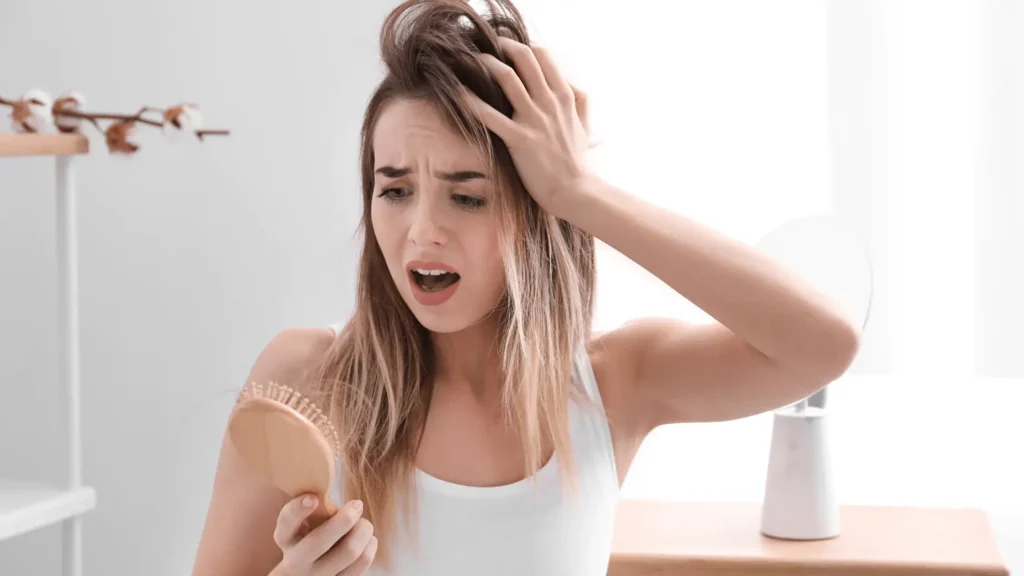Hair loss is a pervasive issue that affects millions worldwide, transcending age, gender, and ethnicity. Its impact goes beyond the physical, often touching the very core of an individual’s self-esteem and confidence. The reasons behind hair loss are as varied as its sufferers, ranging from genetic predispositions to lifestyle factors and beyond. Understanding these underlying causes is not just crucial but the first step in effectively addressing and managing this condition.
In “14 Proven Strategies to Avoid Hair Loss Now!” we explore effective, science-based methods to prevent and sometimes reverse hair loss. Our aim is to provide knowledge and tools for improved hair health. The article covers strategies for those experiencing thinning or looking to prevent hair loss, focusing on addressing root causes and proactive measures. By following these steps, you can reduce hair loss effects, boosting confidence and self-image.
Understanding Hair Loss
Understanding the multifaceted nature of hair loss is fundamental in crafting effective prevention strategies. At its core, hair loss can be attributed to a variety of factors, each playing a distinct role in the health of your scalp and hair. Genetics stands as a primary contributor, with conditions such as androgenetic alopecia affecting a significant portion of the population, showcasing a hereditary predisposition to thinning hair and baldness. However, the story doesn’t end with genetics; lifestyle factors and environmental stressors contribute significantly to hair health. Stress, both physical and emotional, can precipitate sudden hair shedding, known medically as telogen effluvium, underscoring the body’s integrated response to distress.
Nutritional deficiencies cannot be overlooked, as the absence of vital nutrients like iron, protein, and essential vitamins directly impacts hair growth and retention. Similarly, hormonal imbalances, particularly those involving thyroid hormones or changes during pregnancy and menopause, play a critical role. Underlying medical conditions, including autoimmune diseases like alopecia areata, further complicate the landscape of hair loss causes.
Identifying the root cause of hair loss is more than a diagnostic step; it’s a critical foundation upon which effective prevention and treatment strategies are built. Without pinpointing the specific factors at play, attempts to halt or reverse hair loss may be misguided or less effective. As such, understanding the underlying causes is not merely an academic exercise but a practical pathway to targeted, successful interventions in the battle against hair loss.

14 Proven Strategies to Avoid Hair Loss Now!
Maintain a Balanced Diet
A nutrient-rich diet is fundamental to preventing hair loss. Essential nutrients like iron, protein, and vitamins A, C, D, and E play pivotal roles in hair health. Zinc and omega-3 fatty acids are also crucial for maintaining the strength and vitality of your hair. These elements support hair follicle health, promote hair growth, and prevent hair thinning. Incorporating a variety of fruits, vegetables, lean proteins, and healthy fats into your daily diet can provide your hair with the nutrients it needs to flourish.
Scalp Care and Hygiene
Proper scalp care is essential for preventing hair loss. This includes washing your hair with a gentle shampoo to remove buildup without stripping the scalp of its natural oils. Avoiding harsh chemicals and choosing the right hair care products are vital steps in maintaining scalp health. Additionally, regular scalp massages can stimulate blood flow, supporting healthy hair growth.
Reduce Stress
Stress is a significant factor in hair loss, triggering conditions like telogen effluvium. Techniques such as meditation, yoga, and regular exercise can effectively lower stress levels, thus mitigating their impact on your hair. Establishing a routine that includes these stress-reduction methods can help maintain both your mental health and your hair’s vitality.
Avoid Tight Hairstyles
Tight hairstyles, such as ponytails, braids, and buns, can lead to traction alopecia, a condition caused by constant pull on the hair roots. Opting for looser hairstyles and alternating your hairdo can prevent unnecessary stress on your hair follicles, reducing the risk of hair loss.
Limit Heat and Chemical Treatments
Frequent use of hair dyes, bleaches, and heat styling tools can weaken your hair, leading to breakage and loss. Minimizing these treatments and using protective products when styling can help preserve hair health and avoid damage.
Consider Essential Oils
Essential oils such as rosemary, peppermint, and lavender have been shown to promote hair growth and improve hair health. Incorporating these oils into your hair care routine through scalp massages or adding them to your products can stimulate hair follicles and encourage growth.
Stay Hydrated
Hydration plays a crucial role in maintaining overall health, including the health of your scalp and hair. Drinking sufficient water daily helps regulate the hair growth cycle and supports the health of hair cells, preventing dryness and brittleness.
Regular Exercise
Physical activity improves blood circulation throughout the body, including the scalp. Improved blood flow ensures that your hair follicles receive adequate nutrients and oxygen, essential for hair growth and strength.
Quit Smoking
Smoking negatively affects blood circulation, leading to reduced blood flow to the scalp and hair follicles. This can impair hair growth and increase the risk of hair loss. Quitting smoking can halt further damage and support hair health.
Get Regular Trims
Regular trims help avoid split ends and hair breakage, both of which can weaken hair and contribute to its loss. Keeping your hair trimmed ensures it remains healthy and strong.
Use Gentle Hair Care Practices
Being gentle when brushing or styling your hair can prevent unnecessary stress and damage. Avoid brushing wet hair, which is more vulnerable to breakage, and use a wide-toothed comb to detangle gently.
Consider Supplements
If your diet lacks specific nutrients essential for hair health, supplements can help fill these gaps. Biotin, Vitamin D, iron, and zinc supplements may improve hair health. However, it’s essential to consult with a healthcare provider before starting any new supplement regimen.
Consult with a Dermatologist
If you’re experiencing significant hair loss, consulting with a dermatologist is crucial. They can offer professional advice, diagnose underlying conditions, and recommend appropriate treatment options tailored to your specific needs.
Explore the Benefits of Abundant Hair Gummies:
Abundant Hair Gummies are at the forefront of hair restoration technology, offering a potent and natural solution to hair loss, thinning, and bald spots. These gummies are formulated with a blend of 100% natural ingredients, including vital proteins, vitamins, and minerals that target the root cause of hair loss.
By integrating ingredients like biotin, vitamin E, vitamin C, vitamin B6, and folate, Abundant targets the deficiencies that lead to alopecia and hair thinning. With the promise of regrowing thick, shiny, and healthy hair, these Abundant hair gummies not only stimulate hair growth at a cellular level but also aim to avoid future hair loss.
The benefits of incorporating Abundant Hair Gummies into your daily routine are manifold:
– Prevention of Hair Shedding and Thinning: These gummies provide a straightforward solution to reducing hair fall and promoting the growth of thicker and longer hair strands.
– Addressing the Root Cause of Hair Loss: The nutrient-rich formula of Abundant directly targets the underlying issues causing alopecia and bald spots, facilitating the rejuvenation of hair health and strength.
– Accelerated Hair Regrowth: With its advanced formula, Abundant accelerates the process of hair regrowth, enabling users to witness visible improvements in hair volume and density within a few weeks.
– Boosting Confidence: The efficacy of Abundant Hair Gummies in reversing hair loss and enhancing hair appearance significantly boosts users’ self-esteem and confidence, impacting their overall quality of life positively.
– Safety and Natural Composition: Being GMP certified and made in the USA, these gummies ensure safety and reliability. The all-natural composition minimizes the risk of side effects, making it a safe choice for long-term use.
Incorporating Abundant Hair Gummies into your hair care routine can be a game-changer for individuals experiencing hair loss. Not only do these gummies offer a natural and effective solution to hair growth challenges, but they also provide a convenient and non-invasive method to achieve a fuller, healthier head of hair.
Myths vs. Facts About Hair Loss
Myth 1: Only men suffer from hair loss.
Fact: Hair loss does not discriminate by gender. Women also experience hair loss, although the pattern and visibility might differ from men.
Myth 2: Wearing hats causes hair loss.
Fact: No evidence suggests that hats or caps contribute to hair loss. Hair loss is primarily attributed to genetic, hormonal, and environmental factors, not from wearing headgear.
Myth 3: Frequent shampooing leads to hair loss.
Fact: Washing your hair with shampoo removes dirt and excess oil, but it does not cause hair loss. The key is to use a gentle, sulfate-free shampoo to avoid irritating the scalp.
Myth 4: Cutting hair makes it grow back thicker.
Fact: Hair thickness is determined by the follicle size, which is not affected by cutting. While trimming can improve the appearance of your hair by removing split ends, it does not influence the growth rate or thickness.
Myth 5: Stress is only a minor factor in hair loss.
Fact: Significant stress can lead to conditions like telogen effluvium, where hair falls out at an accelerated rate. Managing stress is crucial for maintaining overall health, including hair health.
Debunking these myths is essential for understanding hair loss and adopting effective prevention strategies. Recognizing the facts helps individuals approach hair loss with accurate knowledge, leading to more appropriate and effective treatments.

Implementing These Strategies into Your Daily Routine
Incorporating hair loss prevention strategies into your daily routine need not be a daunting task. Here are some practical tips to seamlessly adopt these measures for maximum effectiveness:
Nutrition: Make simple dietary adjustments to include more leafy greens, nuts, seeds, and lean proteins in your meals. These foods are rich in the essential vitamins and minerals needed for hair health.
Scalp Care: Choose a specific day or two each week for a deep scalp cleanse using gentle, sulfate-free shampoos. Incorporate a quick scalp massage while showering to stimulate blood flow.
Stress Reduction: Dedicate a few minutes each morning or evening to meditation or deep breathing exercises. Integrating short, brisk walks or yoga sessions into your week can also effectively lower stress levels.
Hair Styling: Opt for loose hairstyles more frequently and save tight styles for special occasions. When using heat styling tools, always apply a heat protectant to minimize damage.
Hydration and Exercise: Carry a reusable water bottle to ensure you stay hydrated throughout the day. Schedule regular exercise into your calendar as you would any important appointment.
Professional Advice: Schedule annual check-ups with a dermatologist to monitor your scalp and hair health, making it easier to address any issues promptly.
By making these strategies part of your lifestyle, you can proactively maintain your hair’s health and vitality, preventing hair loss with minimal effort.
Conclusion:
In conclusion, taking proactive measures against hair loss is not just about preserving your hair; it’s about maintaining your overall well-being. As we’ve explored, a combination of balanced nutrition, proper scalp care, stress management, and gentle hair styling can significantly contribute to preventing hair loss. It’s crucial to adopt a holistic approach that encompasses lifestyle changes and seeks professional advice when necessary. Remember, your hair’s health is a reflection of your overall health, and taking control of one aspect often means improving all others.
Let this guide be your first step towards taking control of your hair health. With determination and consistency, you can protect and enhance your hair’s natural beauty. Your hair’s vitality is in your hands, embrace the journey with confidence and optimism.
FAQs To Avoid Hair Loss
Can diet really affect my hair health?
Yes, a balanced diet rich in essential vitamins, minerals, and proteins plays a critical role in supporting hair follicle health and can significantly affect hair growth and strength.
How often should I wash my hair to avoid hair loss?
The frequency of washing your hair depends on your scalp type and activity level. Generally, washing 2-3 times a week with a gentle shampoo is recommended to maintain scalp hygiene without stripping natural oils.
Can stress cause permanent hair loss?
While stress can lead to temporary hair loss conditions like telogen effluvium, managing stress and adopting a healthy lifestyle can help your hair regrow once the stressor is removed.
Are tight hairstyles really harmful to my hair?
Yes, consistently wearing tight hairstyles can lead to traction alopecia, a form of hair loss caused by pulling on the hair roots. Opting for looser styles can prevent this condition.
Is it necessary to consult a dermatologist for hair loss?
If you’re experiencing significant hair loss, it’s a good idea to consult a dermatologist. They can diagnose underlying conditions, recommend treatment options, and provide personalized advice.
How effective are essential oils in preventing hair loss?
Essential oils like rosemary and peppermint have been shown to promote hair growth in some studies. However, results can vary, and they should be used as part of a broader hair care and health strategy.
Will cutting my hair short help avoid hair loss?
Cutting hair short won’t avoid hair loss caused by internal factors but can reduce stress on your hair from styling and detangling, which can minimize breakage and the appearance of thinning.
Disclaimer: The content provided in this article is for informational purposes only and is not intended as medical advice. Always consult with a healthcare professional before starting any new supplement regimen or treatment plan. Additionally, please note that I may receive a small commission if you decide to purchase any of the products featured in this article. This helps support our work but does not influence our recommendations or opinions. Your trust is important to us, and we strive to provide honest and helpful content.




